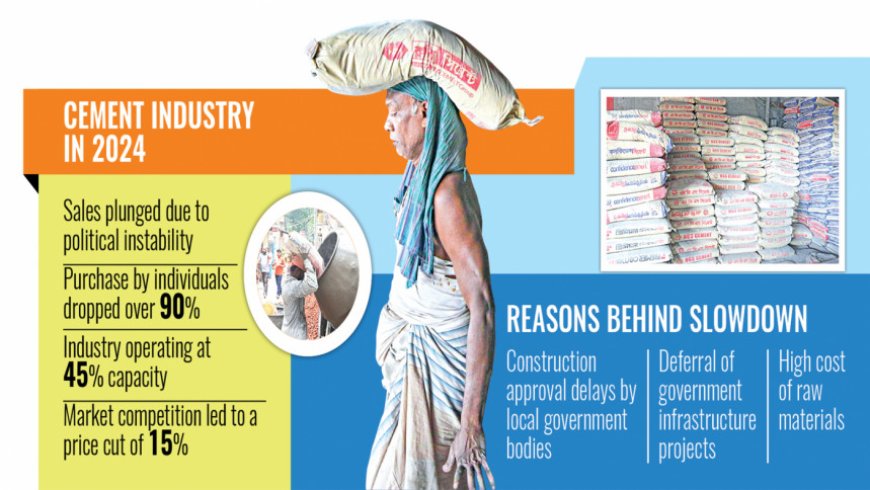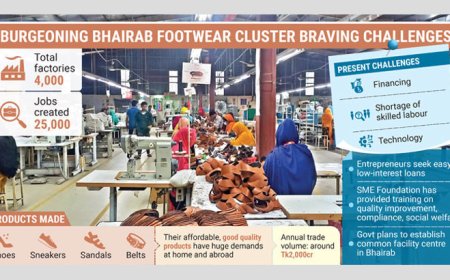The cement industry faces difficulties due to ongoing political and economic challenges
The cement industry faces difficulties due to ongoing political and economic challenges

Cement sales in Bangladesh experienced a significant decline in 2024 due to political instability, escalating production costs, and delays in government infrastructure projects, resulting in the industry operating at less than half its capacity. Mohammad Iqbal Chowdhury, CEO of LafargeHolcim Bangladesh PLC, attributed the downturn to political turmoil, macroeconomic challenges, inflation, and the suspension of key government projects, which have caused substantial disruptions in the construction sector.
Mohammed Amirul Haque, CEO of Premier Cement Mills Limited, emphasized that the halt of major infrastructure projects, a primary consumer of cement, has worsened the sector's struggles. However, Haque remained hopeful, stating that with political stability and economic recovery, the sector could rebound.
"The cement industry has overcome crises in the past and remains resilient," he said, expressing confidence in a potential recovery in the coming years.
The cement sector, vital to Bangladesh's construction industry, is facing dwindling demand and rising production costs. Md Moshiur Rahman Dalim, head of business at Akij Cement Company, noted that traditionally, about 60 percent of cement consumption came from individual projects, with the remaining 40 percent directed towards government and organizational infrastructure. However, this balance has shifted dramatically, leading to a bleak outlook.
Dalim revealed that individual cement consumption has fallen by over 90 percent due to delays in receiving necessary approvals from local authorities, such as city corporations and municipalities, which are essential for construction. The absence of elected representatives in local government bodies has further hindered the clearance process, stalling personal construction projects.
With 42 cement factories in Bangladesh having a combined capacity of 84 lakh tonnes per month, the sector is now operating at just 45 percent capacity, producing only 34 lakh tonnes per month, Dalim said. He also pointed out an unprecedented 1.2 percent decline in sales for 2024, compared to the usual 9-10 percent annual growth in cement consumption.
Soaring production costs, driven by increases in electricity and fuel prices, have added to the industry's difficulties. Dalim highlighted that the workforce required to produce 10 lakh tonnes of cement is now being utilized for only 1 lakh tonnes, though no layoffs have occurred despite the downturn.
Additionally, discrepancies in import duties on raw materials are exacerbating the cost challenges. Despite international prices for cement clinker falling to $44 per tonne, the government continues to calculate import duties based on a rate of $62 per tonne, resulting in an additional cost of nearly Tk 2,000 per tonne. A 10 percent increase in the supplementary duty on limestone has further driven up expenses. Dalim also noted that the winter season, typically the peak time for cement sales, failed to provide relief.
The combined effects of reduced demand and rising costs have taken a significant toll on the construction sector, leaving businesses and stakeholders in a precarious position.
Mohammed Khurshed Alam, executive director of Fresh Cement, a subsidiary of Meghna Group of Industries, emphasized the severe challenges the cement sector is facing due to falling demand. Despite the rising costs, manufacturers have been forced to reduce prices by at least 15 percent to stay competitive.
Alam pointed out that the sector has been in decline since 2022, with a consistent negative growth each year, despite averaging 8 percent annual growth since 2010. He attributed the ongoing uncertainty to the lack of an elected government, which has eroded consumer confidence and slowed down construction activity.
"People are hesitant to invest or start new projects because of the political instability," he explained. However, he expressed optimism that the situation would improve once an elected government is in place and begins rolling out large-scale development projects. "When development projects resume and public confidence is restored, the demand for cement will naturally recover," he added.
Until then, the cement and related construction sectors are likely to remain subdued, Alam concluded.
What's Your Reaction?





















































































